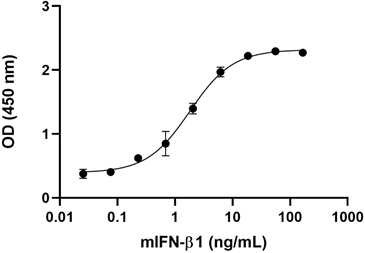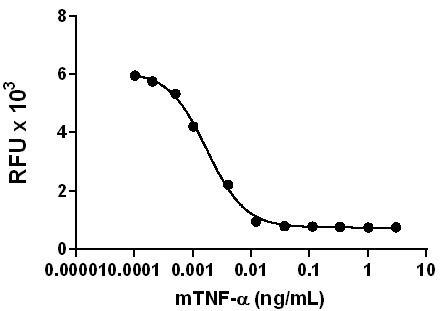- Regulatory Status
- RUO
- Other Names
- Mus musculus interferon alpha 15 (Ifna15), MuIFN-alpha-A, Ifnaa, IFN-alpha, IFNa, IFN-a
- Ave. Rating
- Submit a Review
- Product Citations
- publications

-

Recombinant Mouse IFN-α induces CCL2 (MPC-1) in Raw264.7 cells in a dose dependent manner. The ED50 range for this effect is 0.04 – 0.4 µg/mL
Interferons are divided into type I, II, and III. Type I IFNs (IFN-α and IFN-β) are most abundant in number, distribution, and expression. Also, they are highly conserved among mammals in both structure and function. IFN-α and IFN-β are potent antiviral cytokines that are produced after viral infections, which induce an antiviral state in neighboring cells by upregulating the transcription of IFN-stimulated genes. IFN-α is ubiquitously expressed. Nevertheless, plasmacytoid dendritic cells are the main source of IFN-α in response to invading pathogens. In innate immunity, type I IFNs play a crucial role in the dendritic cell maturation, B cell activation, priming of primary antibody responses, and memory CD8+ T cell proliferation. IFN-α enhanced TLR responsiveness in macrophages by up-regulating the expression of TLR3, TLR4, and TLR7, and thus IFN-α regulates the TLR-dependent gene expression of IFN-α, IFN-β, IL-28, and IL-29. IFN-α had been used in the treatment of chronic hepatitis C (CHC). IFN-α is relatively unstable and requires frequent parenteral administration. The pegylation of IFN-α, polyethylene glycol (PEG)-IFN-α, reduces in vitro activity, but increases the stability and plasma half-life of IFN-α Therefore, PEG-IFN-α has replaced IFN-α in CHC treatment.
Product DetailsProduct Details
- Source
- Mouse IFN alpha A, amino acids (Cys24 - Glu190) (Accession # NM_206870), was expressed in E. coli.
- Molecular Mass
- The 167 amino acid recombinant protein has a predicted molecular mass of approximately 19.3 kD. The protein migrates at approximately 20 kD in DTT-reducing conditions and at approximately 17 kD in non-reducing conditions by SDS-PAGE. The predicted N-terminal amino acid is Cys.
- Purity
- >95%, as determined by Coomassie stained SDS-PAGE.
- Formulation
- 0.22 µm filtered protein solution is in PBS, pH 7.2.
- Endotoxin Level
- Less than 0.01 ng per µg cytokine as determined by the LAL method.
- Concentration
- 10 and 25 µg sizes are bottled at 200 µg/mL. 100 µg size and larger sizes are lot-specific and bottled at the concentration indicated on the vial. To obtain lot-specific concentration and expiration, please enter the lot number in our Certificate of Analysis online tool.
- Storage & Handling
- Unopened vial can be stored between 2°C and 8°C for up to 2 weeks, at -20°C for up to six months, or at -70°C or colder until the expiration date. For maximum results, quick spin vial prior to opening. The protein can be aliquoted and stored at -20°C or colder. Stock solutions can also be prepared at 50 - 100 µg/mL in appropriate sterile buffer, carrier protein such as 0.2 - 1% BSA or HSA can be added when preparing the stock solution. Aliquots can be stored between 2°C and 8°C for up to one week and stored at -20°C or colder for up to 3 months. Avoid repeated freeze/thaw cycles.
- Activity
- Recombinant Mouse IFN-α induces CCL2 (MPC-1) in Raw264.7 cells in a dose dependent manner. The ED50 range for this effect is 0.04 – 0.4 µg/mL
- Application
-
Bioassay
- Application Notes
-
BioLegend carrier-free recombinant proteins provided in liquid format are shipped on blue-ice. Our comparison testing data indicates that when handled and stored as recommended, the liquid format has equal or better stability and shelf-life compared to commercially available lyophilized proteins after reconstitution. Our liquid proteins are verified in-house to maintain activity after shipping on blue ice and are backed by our 100% satisfaction guarantee. If you have any concerns, contact us at tech@biolegend.com.
- Product Citations
-
Antigen Details
- Structure
- Cytokine.
- Distribution
-
Monocytes/macrophages, fibroblasts, lymphoblastoid cells, and a variety of cell types following induction by viruses. IFN-α is also induced by nucleic acids, glucocorticoid hormones, n-butyrate, and 5-bromodeoxy uridine in different cells.
- Function
- IFN-α stimulates cytotoxic T lymphocytes and natural killer cell function. IFN-α has immunomodulatory and antiviral properties.
- Interaction
- Varieties of cells express the IFNα receptor (IFNAR).
- Ligand/Receptor
- IFNAR complex has two components: IFNAR1 and IFNAR2.
- Bioactivity
- Cytopathic effect inhibition assay using EMC virus on L929 cells.
- Biology Area
- Immunology, Innate Immunity
- Molecular Family
- Cytokines/Chemokines
- Antigen References
-
1. Siren J, et al. 2005. J. Immunol. 174:1932.
2. Bose A, Baral R. 2007. Immunol. Lett. 108:68.
3. Zhao W, et al. 2008. J. Immunol. 180:5483.
4. Sadler AJ, Williams BR. 2008. Nat. Rev. 8:559.
5. BjorcK P, et al. 2011. J. Immunol. 186:1477.
6. Badiger R, et al. 2012. PLoS One 7:e46779.
7. Aghemo A, et al. 2010. Nat. Rev. Gastroenterol. Hepatol. 7:485.
8. Mukherjee KK, et al. 2012. Indian J. Med. Res. 136:54.
9. Becker-Merok A, et al. 2013. Lupus 22:155. - Gene ID
- 242517 View all products for this Gene ID
- UniProt
- View information about IFN-alpha on UniProt.org
Related FAQs
- Why choose BioLegend recombinant proteins?
-
• Each lot of product is quality-tested for bioactivity as indicated on the data sheet.
• Greater than 95% Purity or higher, tested on every lot of product.
• 100% Satisfaction Guarantee for quality performance, stability, and consistency.
• Ready-to-use liquid format saves time and reduces challenges associated with reconstitution.
• Bulk and customization available. Contact us.
• Learn more about our Recombinant Proteins. - How does the activity of your recombinant proteins compare to competitors?
-
We quality control each and every lot of recombinant protein. Not only do we check its bioactivity, but we also compare it against other commercially available recombinant proteins. We make sure each recombinant protein’s activity is at least as good as or better than the competition’s. In order to provide you with the best possible product, we ensure that our testing process is rigorous and thorough. If you’re curious and eager to make the switch to BioLegend recombinants, contact your sales representative today!
- What is the specific activity or ED50 of my recombinant protein?
-
The specific activity range of the protein is indicated on the product datasheets. Because the exact activity values on a per unit basis can largely fluctuate depending on a number of factors, including the nature of the assay, cell density, age of cells/passage number, culture media used, and end user technique, the specific activity is best defined as a range and we guarantee the specific activity of all our lots will be within the range indicated on the datasheet. Please note this only applies to recombinants labeled for use in bioassays. ELISA standard recombinant proteins are not recommended for bioassay usage as they are not tested for these applications.
- Have your recombinants been tested for stability?
-
Our testing shows that the recombinant proteins are able to withstand room temperature for a week without losing activity. In addition the recombinant proteins were also found to withstand four cycles of freeze and thaw without losing activity.
- Does specific activity of a recombinant protein vary between lots?
-
Specific activity will vary for each lot and for the type of experiment that is done to validate it, but all passed lots will have activity within the established ED50 range for the product and we guarantee that our products will have lot-to-lot consistency. Please conduct an experiment-specific validation to find the optimal ED50 for your system.
- How do you convert activity as an ED50 in ng/ml to a specific activity in Units/mg?
-
Use formula Specific activity (Units/mg) = 10^6/ ED50 (ng/mL)
 Login / Register
Login / Register 












Follow Us